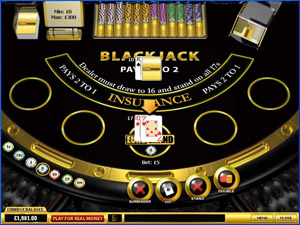Blackjack Rules and Strategy
The rules in a given blackjack game will depend on the variant you are playing and where you're playing it as blackjack rules vary from one casino to the next. The rules of a particular game will also dictate your blackjack strategy.
That said though, most blackjack games are built on a set of fundamental rules that you'll find in most Atlantic City or Las Vegas style blackjack games. Here we'll look at a few basic blackjack rules before moving on to discuss sound basic blackjack strategy.
Basic Blackjack Rules
The objective in any game of blackjack is to beat the dealer's hand without busting (i.e. going over a total card value of 21).
Card values are assigned given on their face value (2 to 10 as indicated on them), with Face Cards (Jack, King and Queen) having a 10 value. Aces are worth either one or 11, whichever you need to help you to build a stronger hand.
In a blackjack game, each player as well as the dealer is dealt two cards. One of the dealer's cards remains face down until the hand is complete. During game play, players are given the option to "Hit" in order to receive another card, or "Stand" to keep their current cards and end their turn.
Players also have the option of doubling on certain hands, in this move you bet value is doubled and you receive an additional card. Likewise, splitting also doubles your bet, but in splitting cards you will have two hands instead of one to play with. Both doubling and splitting are only permitted on your first move or the first move if you've split cards. In most cases you cannot play two Aces once they have been split, and you will be permitted to double hands resulting from a split, effectively tripling or quadrupling your wager.
If your card values total more than 21, you bust and lose your bet. If you are dealt an Ace and a ten, you have blackjack which generally means that you win 1.5 times the amount that you wagered, depending on the casino and their payout rules (something to look at before you play).
Blackjack Strategy
When it comes to playing according to blackjack strategy, players can make use of a blackjack strategy chart for the particular game variant they are playing. You can memorise these charts or print them out and keep them next to you as you play. When playing online, many blackjack games have an autoplay option that is designed to play according to perfect strategy on your behalf. This is just another reason why you should be playing blackjack online , especially as a beginner.
To read these cards, look up the hand you are holding on the left vertical, and the dealer's upcard along the top of the chart in order to ascertain the best move for your hand.
If you prefer to commit blackjack strategy to memory, then these are the key points to remember in order to minimise mistakes.
Surrendering in Blackjack:
- Surrender 16 if the dealer holds 9, 10, King, Queen, Jack or Ace. If not, do not surrender and refer to hard totals plays.
- A total of 15 should be surrendered to a dealer's 10, in any other event do not surrender.
When to Split in Blackjack
- Cards that should always be split: Aces and eights
- Tens should never be split
- A pair of two's should only be split if the dealer holds two, three, four, five, six or seven, otherwise hit.
- Three's should be split if the dealer holds any card valued from two to seven, if not, hit.
- Four's should only be split if the dealer holds five or six.
- Five's should be doubled if the dealer has any card value from two to nine.
- Sixes split if the dealer holds cards valued from two through to six.
- Seven's split if the dealer has a card valued from two to seven.
- Nines are split if the dealer's card is valued at anything from two to nine, except for seven, otherwise stand.
Soft Hand Totals
When it comes to blackjack strategy you will see many references to Soft hands or soft totals. A soft hand is any blackjack hand that has an Ace dealt as one of the initial two cards, so the Ace counts as a value of eleven to start off with.
- Soft 13 (Ace plus 2) and Soft 14 (Ace plus 3) should double if the dealer is holding five or six, otherwise hit.
- Soft 15 and Soft 16 should double if the dealer holds four, five or six, otherwise hit.
- Soft 17 should double if the dealer holds three, four, five or six, if not, hit.
- Soft 18 doubles if the dealer holds two, three, four, five or six and hits against 9, 10, Jack, Queen, King or Ace.
- Soft 19 doubles against the dealer 6
- With Soft 20 always stand
Hard Hand totals
A hard hand or hard total in blackjack is any hand that does not consist of an Ace from the start, or that is dealt an Ace which can only count as one instead of 11.
- Always hit on hard 8
- 9 should be doubled when facing the dealers hand valued at three, four, five or six
- Double 10 against the dealers cards if they total two to nine, if not, hit
- Always double on 11
- Stand on 12 when facing the dealer's cards of four, five or six, otherwise hit
- Stand on 13 if you face the dealer's hand consisting of two, three, four, five or six
- 14, 15 and 16 stand if the dealer has cards two through six, if not, hit
- 17 and above should always stand


